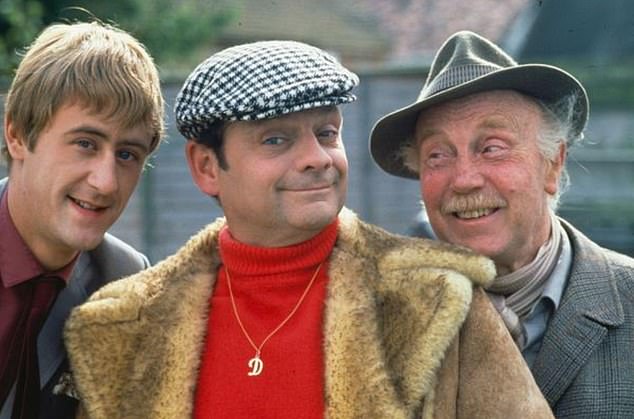Del Boy won’t be happy! Research reveals the British insults that will soon be consigned to history, including ‘prat’, ‘plonker’ and ‘numpty’. So is your favorite at risk of extinction?
- Researchers asked 2,000 Britons about their favorite insults
- They discovered that fifteen classics will become extinct within a generation
From ‘plonker’ to ‘prat’, Only Fools and Horses was known for its hilariously British insults.
But Del Boy won’t be very happy, because a new study has warned that some of our favorite negatives are at risk of becoming extinct.
Researchers from Perspectus Global surveyed 2,000 Britons about their favorite insults and discovered that 15 classics will become extinct within a generation.
At the top of the list is ‘lummox’, while ‘bampot’, ‘blighter’ and ‘ninny’ are also on their last legs, according to the study.
Will your favorite insult soon become history?
Researchers at Perspectus Global surveyed 2,000 Brits about their favorite insults and discovered that 15 classics will become extinct within a generation

From ‘plonker’ to ‘prat’, Only Fools and Horses was known for its hilarious British insults
In the study, researchers asked 2,000 Britons of different ages about their favorite insults.
The results showed that 72 percent of Brits agree that we have a unique style when it comes to contempt, while 81 percent believe that insulting your loved ones is a very British trait.
However, half of Britons over 40 believe that insults used to be of a milder nature.
The East Anglian term ‘lummox’ – meaning clumsy oaf – topped the risk list as it was not heard by 62 per cent of young Brits.
This was followed by ‘bampot’ – a Scottish slang word meaning an unpleasant person – which had not been heard by 60 percent of young Brits.
‘Blighter’ (unknown to 54 per cent of young Brits) was next on the list, followed by ‘ninny’ (51 per cent), ‘cad’ (47 per cent) and ‘drip’ (42 per cent).
Other popular insults that are in danger of dying out are ‘tosspot’, ‘plonker’, ‘nitwit’ and ‘prat’.
“Language is changing, evolving and moving forward,” said Harriet Scott, CEO of Perspectus Global.
‘Our research shows that calling someone a plonker or a prat is no longer a fashionable way to insult them.
‘Interestingly, the research highlights the extent to which Britons find some of the more traditional swear words softer and less severe than some of today’s more controversial swear words.
“It was fascinating to research thousands of old insults such as ‘mooncalf’, which used to mean a fool, or ‘Cozener’, which means a trickster dating back to Shakespeare’s England.”
The news comes shortly after Countdown’s Susie Dent revealed the historic words she wants to see returned to the English language.
One of her many favorites is “nodcrafty,” which despite being from the 1800s, is perfect “for any Zoom meeting.”
“Nodding is having the knack of nodding your head as if you’re really following along, but actually tuned out ages ago,” she told MailOnline.
‘I think that is a very important skill.’
Another little-known word, ‘apricity’, describes ‘the most perfect feeling’: the warmth of the sun on your back on a winter’s day.
“There’s only one entry in the dictionary, from 1623,” Susie explained.
‘It’s almost like a linguistic mayfly: it only survived for a day, it seems, and then disappeared.
‘But weather forecasters are starting to use it, which is brilliant.’
Yet another, created in the 16th century, is ‘mumpsimus’ – someone who insists he is right despite clear evidence that he is not.
Meanwhile, the delightful Scottish term ‘hurkle-durkle’ means lying in bed or lazing around when you should be out and about.
